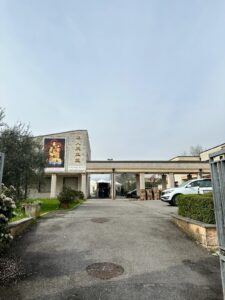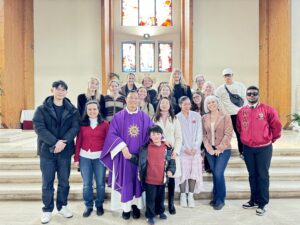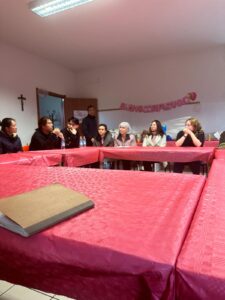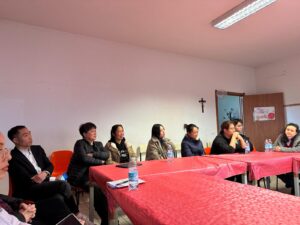“The Italian Dream” for Members of the Chinese Community in Prato
By Vivian Anderson and Keon Eady
 On Sunday, March 17, 2024, we visited the Chinese community in Prato. Prato is well known in Italy for its abundance of clothing factories and clothing production. Chinese community members are typically the main ones populating these factories in Prato, although migrant workers from Bangladesh, Pakistan, and other countries have moved there in the last few years. Our visit directly followed our conversation the night before in Florence at the BioFashion Lab with Pakistan migrant workers in clothing factories in Prato who were experiencing discrimination and exploitation in their workplace. They spoke on their unethical work conditions, working hours and their inability to become a union worker in their factory. Our visit with the Chinese community in Prato was centered around talking with the members of the community and interviewing the workers in these clothing factories to get a gauge on the ethical practices of these clothing factories. The priest of the community invited us to not only have this conversation but also to get fully immersed in the community through meals, church service and playing games with the members of the community.
On Sunday, March 17, 2024, we visited the Chinese community in Prato. Prato is well known in Italy for its abundance of clothing factories and clothing production. Chinese community members are typically the main ones populating these factories in Prato, although migrant workers from Bangladesh, Pakistan, and other countries have moved there in the last few years. Our visit directly followed our conversation the night before in Florence at the BioFashion Lab with Pakistan migrant workers in clothing factories in Prato who were experiencing discrimination and exploitation in their workplace. They spoke on their unethical work conditions, working hours and their inability to become a union worker in their factory. Our visit with the Chinese community in Prato was centered around talking with the members of the community and interviewing the workers in these clothing factories to get a gauge on the ethical practices of these clothing factories. The priest of the community invited us to not only have this conversation but also to get fully immersed in the community through meals, church service and playing games with the members of the community.
 Before we began interviewing the people of the community we first attended Mass, which was held in Chinese. The church was quite different from the ones we have previously seen in Italy. The architecture was very modern, so the walls were a shade of white with wood accents. While the interior of the church still had basic necessities like the altar, basin for holy water and a side room there was a lack of sculpture and inlets with artwork dedicated to specific icons. The main table that sat upon the altar was also white with an image of crucified Jesus on the leg of it. There was other religious imagery upon the windows however they weren’t stained glass. They appeared to have paint on them instead. The difference in church set up was much different from the churches we otherwise saw in Italy. It really solidified how recently this community had come together fully and didn’t have the enormous history that many other communities of Italy boast about. But it was clear through the Mass and how well they cared for their church that they were proud of what community they had and that they held great respect for their creations.
Before we began interviewing the people of the community we first attended Mass, which was held in Chinese. The church was quite different from the ones we have previously seen in Italy. The architecture was very modern, so the walls were a shade of white with wood accents. While the interior of the church still had basic necessities like the altar, basin for holy water and a side room there was a lack of sculpture and inlets with artwork dedicated to specific icons. The main table that sat upon the altar was also white with an image of crucified Jesus on the leg of it. There was other religious imagery upon the windows however they weren’t stained glass. They appeared to have paint on them instead. The difference in church set up was much different from the churches we otherwise saw in Italy. It really solidified how recently this community had come together fully and didn’t have the enormous history that many other communities of Italy boast about. But it was clear through the Mass and how well they cared for their church that they were proud of what community they had and that they held great respect for their creations.
 After the Mass, we started our conversation with some of the workers in the community. Their occupations ranged from teachers to receptionists to clothing factory workers to clothing factory owners. We tried to put an emphasis on the experience of the workers in the clothing industry because of its relevance to our topic; however, we were still able to receive great insight and make parallels with others that weren’t working in the clothing industry. It was intriguing to see the difference in things such as comfortability in responding to certain questions given that some of the owners of the clothing factories were also present. In fact, many of our questions directed towards the workers ended up being answered by the owners and we were able to recognize this as a group, leading us to determine that we might not have really learned the true life experiences of some of the workers. There was also a language barrier which added another layer of confusion to the answers of certain questions, as we translated among three languages, Chinese, Italian, and English. Nonetheless, we were still able to learn about how intense their work lives can be (one women pointed out how she regularly made 100 shirts a day which is about 1 shirt every 4.8 minutes in an average 8 hour work day: this fact makes us think these are probably much much longer than 8 hour days). One of the owners kept repeating that their main focus is speed not quality. One of the younger men wryly said that humans are just too slow for the speed that is required. These workers’ journey to Italy also required leaving behind loved ones and being separated from their children because there was no child care. Immigrants move in hopes of creating a better life for themselves while carrying out their dreams in a new country. However, this is not what the members of the Chinese community in Prato or any immigrant envisioned their life would be like in Italy. Italy prides itself in Made in Italy but yet there is still a neglect for the experiences of immigrants in Italy. Meeting with the Chinese community in Prato helped us recognize the major issue of the exploitation of human capital in the clothing industry. It also raised so many issues for us about the complexities of their full lives–from their family life, to their children’s care, to their education, the problems of immigration in Italy–in this community that produces so many clothes for fast fashion in Italy and perhaps elsewhere.
After the Mass, we started our conversation with some of the workers in the community. Their occupations ranged from teachers to receptionists to clothing factory workers to clothing factory owners. We tried to put an emphasis on the experience of the workers in the clothing industry because of its relevance to our topic; however, we were still able to receive great insight and make parallels with others that weren’t working in the clothing industry. It was intriguing to see the difference in things such as comfortability in responding to certain questions given that some of the owners of the clothing factories were also present. In fact, many of our questions directed towards the workers ended up being answered by the owners and we were able to recognize this as a group, leading us to determine that we might not have really learned the true life experiences of some of the workers. There was also a language barrier which added another layer of confusion to the answers of certain questions, as we translated among three languages, Chinese, Italian, and English. Nonetheless, we were still able to learn about how intense their work lives can be (one women pointed out how she regularly made 100 shirts a day which is about 1 shirt every 4.8 minutes in an average 8 hour work day: this fact makes us think these are probably much much longer than 8 hour days). One of the owners kept repeating that their main focus is speed not quality. One of the younger men wryly said that humans are just too slow for the speed that is required. These workers’ journey to Italy also required leaving behind loved ones and being separated from their children because there was no child care. Immigrants move in hopes of creating a better life for themselves while carrying out their dreams in a new country. However, this is not what the members of the Chinese community in Prato or any immigrant envisioned their life would be like in Italy. Italy prides itself in Made in Italy but yet there is still a neglect for the experiences of immigrants in Italy. Meeting with the Chinese community in Prato helped us recognize the major issue of the exploitation of human capital in the clothing industry. It also raised so many issues for us about the complexities of their full lives–from their family life, to their children’s care, to their education, the problems of immigration in Italy–in this community that produces so many clothes for fast fashion in Italy and perhaps elsewhere.
